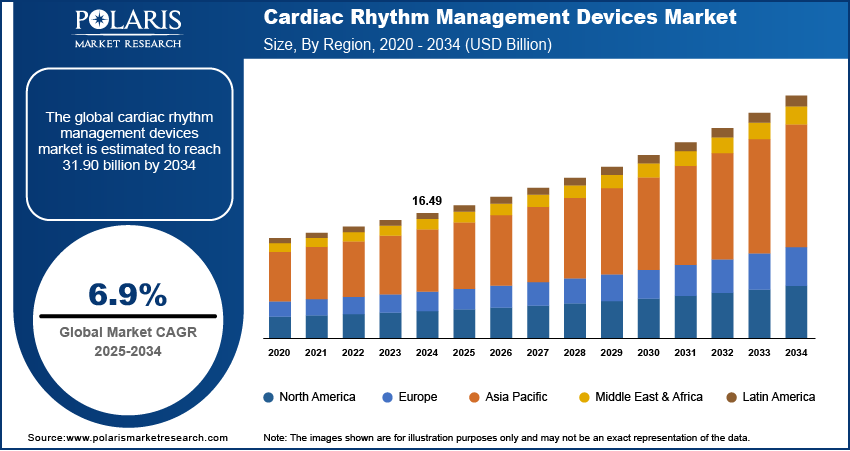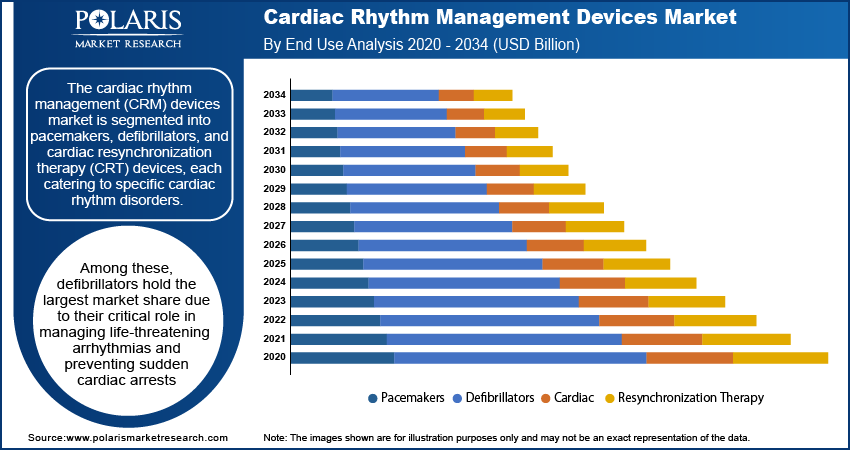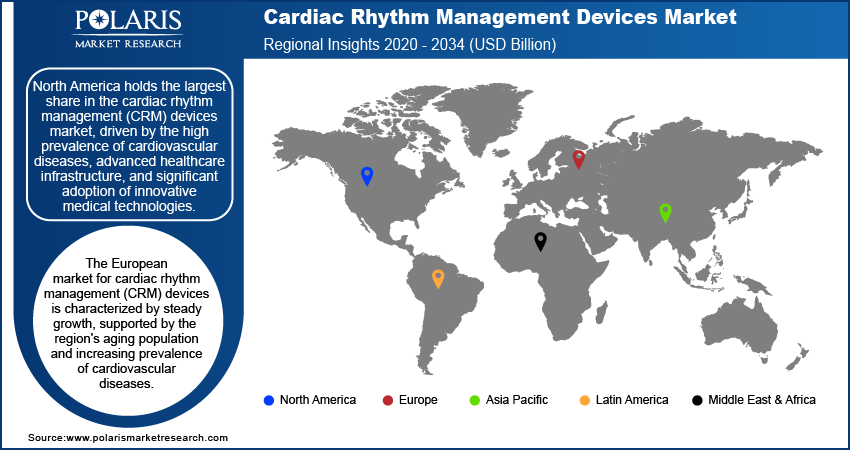
Cardiac Rhythm Management Devices Market Size, Share, Trends, Industry Analysis Report: By Products (Pacemakers, Defibrillators, and Cardiac Resynchronization Therapy (CRT) Devices) and Region (North America, Europe, Asia Pacific, Latin America, and Middle East & Africa) – Market Forecast, 2025–2034
- Published Date:Feb-2025
- Pages: 116
- Format: PDF
- Report ID: PM1529
- Base Year: 2024
- Historical Data: 2020-2023
Cardiac Rhythm Management Devices Market Overview
The cardiac rhythm management devices market size was valued at USD 16.49 billion in 2024. The market is projected to grow from USD 17.50 billion in 2025 to USD 31.90 billion by 2034, exhibiting a CAGR of 6.9% during the forecast period.
The cardiac rhythm management (CRM) devices market encompasses devices used to monitor, regulate, and restore the normal rhythm of the heart in patients with arrhythmias or other cardiac rhythm disorders. This market includes pacemakers, implantable cardioverter defibrillators (ICDs), cardiac resynchronization therapy (CRT) devices, and external defibrillators. Key drivers of cardiac rhythm management devices market growth include the rising prevalence of cardiovascular diseases, the increasing geriatric population, and advancements in device technology, such as MRI-compatible devices and others. Notable trends include the growing adoption of minimally invasive procedures, integration of artificial intelligence for predictive analytics, and increasing demand for wearable cardiac rhythm monitoring devices.

To Understand More About this Research: Request a Free Sample Report
Cardiac Rhythm Management Devices Market Dynamics
Integration of Remote Monitoring and Telemedicine
One of the major trends in the cardiac rhythm management (CRM) devices market is the integration of remote monitoring and telemedicine capabilities into CRM devices. These technologies allow healthcare providers to monitor patient’s cardiac health in real-time, enabling early detection of complications and reducing hospital visits. According to a November 2023 report published by the American College of Cardiology, remote monitoring has been shown to improve patient outcomes, with studies reporting a 50% reduction in mortality among patients using these systems for cardiac care. The increasing focus on value-based healthcare and the need for effective chronic disease management drives the cardiac rhythm management market development.
Advancements in Artificial Intelligence and Predictive Analytics
Artificial intelligence (AI) and predictive analytics are transforming the CRM devices market growth by enhancing diagnostic and therapeutic capabilities. AI-powered algorithms are being incorporated into devices to analyze cardiac data and predict arrhythmias or other complications before they occur. For instance, research published in Nature Medicine in 2023 highlighted that predictive model integrated into CRM devices demonstrated an accuracy rate of over 90% in identifying high-risk patients. These advancements not only enhance device functionality but also contribute to personalized patient care, reducing unnecessary interventions and improving overall efficiency in cardiac rhythm management.
Rising Popularity of Wearable and Minimally Invasive Devices
The cardiac rhythm management market is experiencing a growing demand for wearable and minimally invasive CRM devices driven by patient preferences for comfortable and less invasive solutions. Innovations such as leadless pacemakers and implantable loop recorders have gained traction due to their reduced procedural risks and improved patient quality of life. Additionally, wearable cardiac monitors, which offer continuous heart rate tracking, are gaining popularity among both patients and healthcare providers. According to a 2024 report published by the American Heart Association, wearable devices are projected to account for a significant proportion of non-invasive monitoring solutions due to their ease of use and increasing accuracy.
 Devices Market.jpg)
Cardiac Rhythm Management Devices Market Segment Insights
Cardiac Rhythm Management Devices Market Assessment by Products
The cardiac rhythm management (CRM) devices market assessment, based on products, includes pacemakers, defibrillators, and cardiac resynchronization therapy (CRT) devices, each catering to specific cardiac rhythm disorders. Among these, defibrillators hold the largest cardiac rhythm management devices market share due to their critical role in managing life-threatening arrhythmias and preventing sudden cardiac arrests. Their demand is boosted by the high prevalence of conditions such as ventricular fibrillation and tachycardia, along with increasing awareness about the availability of advanced implantable and external defibrillator options. Technological advancements, such as the development of subcutaneous implantable defibrillators, have further enhanced adoption in clinical practice.
Cardiac resynchronization therapy (CRT) devices are also registering the highest growth within the market, primarily driven by the increasing global incidence of heart failure and associated complications. CRT devices, such as CRT-D (defibrillator) and CRT-P (pacemaker) types, have demonstrated efficacy in improving heart function and patient quality of life. The growth of this segment is supported by expanding indications for CRT device use, particularly in managing patients with reduced ejection fraction and dyssynchronous ventricular contraction. Continued innovation, including devices with advanced sensor technologies and longer battery life, is expected to fuel the adoption of CRT systems further.

Cardiac Rhythm Management Devices Market Regional Insights
By region, the study provides cardiac rhythm management devices market insights into North America, Europe, Asia Pacific, Latin America, and the Middle East & Africa. North America holds the largest market share, driven by the high prevalence of cardiovascular diseases, advanced healthcare infrastructure, and significant adoption of innovative medical technologies. The region benefits from a strong presence of leading CRM device manufacturers and a well-established reimbursement framework, which facilitates access to advanced treatments. According to the American Heart Association, approximately 19.1 million deaths globally in 2023 were attributed to cardiovascular diseases, with a substantial burden in the US. Additionally, initiatives to raise awareness about heart health and early diagnosis contribute to the dominant position of North America in the market. Other regions, such as Europe and Asia Pacific, are witnessing steady growth due to rising healthcare investments and increasing adoption of CRM devices.
The cardiac rhythm management (CRM) devices market in Europe is characterized by steady growth, supported by the region's aging population and increasing prevalence of cardiovascular diseases. Countries such as Germany, France, and the UK are leading contributors, owing to well-established healthcare systems and favorable reimbursement policies. Regional government’s efforts to address the growing burden of heart diseases through awareness programs and funding for advanced technologies further boost market growth. Additionally, advancements in minimally invasive devices and remote monitoring capabilities are driving adoption across the region.
Asia Pacific is witnessing significant growth in the CRM devices market, primarily driven by the increasing prevalence of heart diseases and rising healthcare expenditure. Emerging economies such as China and India are major contributors, supported by expanding healthcare infrastructure and government initiatives aimed at improving cardiac care. Additionally, growing awareness of CRM devices, coupled with the availability of cost-effective treatment options, is accelerating CRM devices market growth in this region. The presence of a large patient population and increasing penetration of global manufacturers are further fueling market expansion in Asia Pacific.

Cardiac Rhythm Management Devices Market – Key Market Players and Competitive Insights
Key players in the cardiac rhythm management (CRM) devices industry include Medtronic, Abbott Laboratories, Boston Scientific Corporation, Biotronik SE & Co. KG, MicroPort Scientific Corporation, Livanova PLC, and Koninklijke Philips N.V. Other active participants are Zoll Medical Corporation (a subsidiary of Asahi Kasei), Schiller AG, Lepu Medical Technology, Shree Pacetronix Ltd., EBR Systems, Oscor Inc., Stryker Corporation, Cardiac Science Corporation, and Pacetronix. These companies are engaged in developing and distributing a broad portfolio of CRM devices, including pacemakers, defibrillators, and cardiac resynchronization therapy systems. Their focus on research and development enables the introduction of devices with advanced features such as MRI compatibility and remote monitoring capabilities.
Competitive dynamics in the market are shaped by innovation, strategic partnerships, and regional market expansions. Companies such as Medtronic and Abbott Laboratories emphasize technological advancements, leveraging AI and predictive analytics in their products to enhance patient outcomes. Meanwhile, firms such as Boston Scientific and Biotronik focus on expanding their global footprint through collaborations with local healthcare providers and distributors. Additionally, regional players such as Shree Pacetronix in India cater to cost-sensitive markets, offering affordable yet efficient CRM devices.
Insights into competition reveal that established companies invest significantly in R&D and clinical trials to strengthen their product offerings. At the same time, newer entrants aim to disrupt the market with niche innovations such as leadless pacemakers or alternative energy sources for implants. The market also sees growing interest in collaborations between manufacturers and digital health firms to integrate telemedicine and remote monitoring capabilities. Overall, the market remains competitive with a balance of technological advancement and cost-effectiveness driving market strategies.
Medtronic is a prominent company in the cardiac rhythm management devices market. It offers a comprehensive range of pacemakers, implantable defibrillators, and cardiac resynchronization therapy devices. The company is known for its focus on integrating advanced technologies such as remote monitoring and MRI compatibility into its products.
Abbott Laboratories is another significant player in the market. Its portfolio includes implantable defibrillators, pacemakers, and diagnostic tools for cardiac care. The company emphasizes innovations that improve patient outcomes, such as devices with Bluetooth connectivity for real-time data sharing with healthcare providers.
Key Companies in Cardiac Rhythm Management Devices Market
- Abbott Laboratories
- Biotronik SE & Co. KG
- Boston Scientific Corporation
- Cardiac Science Corporation
- EBR Systems
- Koninklijke Philips N.V.
- Lepu Medical Technology
- LivaNova PLC
- Medtronic
- MicroPort Scientific Corporation
- Oscor Inc.
- Schiller AG
- Shree Pacetronix Ltd.
- Stryker Corporation
- Zoll Medical Corporation (a subsidiary of Asahi Kasei)
Cardiac Rhythm Management Devices Market Developments
- November 2024: Abbott received FDA approval for its new dual-chamber leadless pacemaker, marking a milestone in the development of devices that reduce procedural risks and improving long-term device performance.
- October 2024: Medtronic announced the launch of its next-generation leadless pacemaker, expanding its offerings in minimally invasive solutions for patients with bradycardia. The new device is designed to enhance patient comfort while maintaining efficient cardiac rhythm management.
Cardiac Rhythm Management Devices Market Segmentation
By Products Outlook (Revenue-USD Billion, 2020 – 2034)
- Pacemakers
- Defibrillators
- Cardiac Resynchronization Therapy (CRT) Devices
By Regional Outlook (Revenue-USD Billion, 2020 – 2034)
- North America
- US
- Canada
- Europe
- Germany
- France
- UK
- Italy
- Spain
- Netherlands
- Russia
- Rest of Europe
- Asia Pacific
- China
- Japan
- India
- Malaysia
- South Korea
- Indonesia
- Australia
- Vietnam
- Rest of Asia Pacific
- Middle East & Africa
- Saudi Arabia
- UAE
- Israel
- South Africa
- Rest of Middle East & Africa
- Latin America
- Mexico
- Brazil
- Argentina
- Rest of Latin America
Cardiac Rhythm Management Devices Market Report Scope:
|
Report Attributes |
Details |
|
Market Size Value in 2024 |
USD 16.49 billion |
|
Market Size Value in 2025 |
USD 17.50 billion |
|
Revenue Forecast in 2034 |
USD 31.90 billion |
|
CAGR |
6.9% from 2025 to 2034 |
|
Base Year |
2024 |
|
Historical Data |
2020–2023 |
|
Forecast Period |
2025–2034 |
|
Quantitative Units |
Revenue in USD billion and CAGR from 2025 to 2034 |
|
Report Coverage |
Revenue Forecast, Market Competitive Landscape, Growth Factors, and Industry Trends |
|
Segments Covered |
|
|
Regional Scope |
|
|
Competitive Landscape |
|
|
Report Format |
|
|
Customization |
Report customization as per your requirements with respect to countries, regions, and segmentation. |
How is the report valuable for an organization?
Workflow/Innovation Strategy
The cardiac rhythm management devices market has been segmented into detailed product segments. The study provides the reader with a detailed understanding of the segment for the global and regional levels.
Growth/Marketing Strategy
The growth and marketing strategy in the cardiac rhythm management devices market focuses on technological innovation, strategic collaborations, and regional expansions. Companies invest in R&D to introduce advanced features such as AI integration, remote monitoring, and leadless designs, addressing patient and provider needs for better outcomes and convenience. Strategic partnerships with healthcare providers and digital health firms facilitate broader adoption and enhance service delivery. Additionally, expanding into emerging markets with cost-effective solutions helps capture untapped patient populations while adhering to regulatory and healthcare requirements. These approaches collectively strengthen the market presence and drive growth.
FAQ's
? The cardiac rhythm management devices market size was valued at USD 16.49 billion in 2024 and is projected to grow to USD 31.90 billion by 2034.
? The market is projected to register a CAGR of 6.9% during the forecast period, 2025-2034.
? North America had the largest share of the market.
? Key players in the cardiac rhythm management (CRM) devices market include Medtronic, Abbott Laboratories, Boston Scientific Corporation, Biotronik SE & Co. KG, MicroPort Scientific Corporation, Livanova PLC, and Koninklijke Philips N.V. Other active participants are Zoll Medical Corporation (a subsidiary of Asahi Kasei), Schiller AG, Lepu Medical Technology, Shree Pacetronix Ltd., EBR Systems, Oscor Inc., Stryker Corporation, Cardiac Science Corporation, and Pacetronix.
? The defibrillator segment accounted for the largest share of the market.
? Cardiac rhythm management (CRM) devices are medical devices designed to regulate, monitor, or restore the normal rhythm of the heart in individuals experiencing arrhythmias or other cardiac rhythm disorders. These devices include pacemakers, which address slow heart rates; implantable cardioverter defibrillators (ICDs), which treat life-threatening fast rhythms; and cardiac resynchronization therapy (CRT) devices, which improve the heart's pumping efficiency in heart failure patients. CRM devices may also include external defibrillators and wearable monitors for non-invasive rhythm management. They are critical tools in preventing complications such as stroke or sudden cardiac arrest and improving patient quality of life.
? A few key trends in the cardiac rhythm management devices market are described below: Integration of Remote Monitoring: Increased adoption of remote monitoring technologies, allowing real-time data transmission and better management of cardiac conditions. Advancements in Artificial Intelligence (AI): Use of AI for predictive analytics to enhance diagnostic accuracy and personalize treatment plans. Minimally Invasive Procedures: Growing demand for leadless pacemakers and other minimally invasive devices that reduce procedural risks and recovery times. Wearable Devices: Rise in wearable cardiac rhythm monitoring devices for continuous and convenient heart health tracking.
? A new company entering the cardiac rhythm management devices market could focus on developing innovative, minimally invasive devices, such as leadless pacemakers and MRI-compatible implants, which are gaining traction among patients and healthcare providers. Additionally, integrating remote monitoring capabilities and AI-driven predictive analytics could enhance patient outcomes and differentiate the company’s offerings. Targeting emerging markets with affordable yet advanced devices would also be a strategic approach, given the increasing demand for cardiac care in these regions. Collaboration with digital health platforms to offer integrated, real-time monitoring services could further set the company apart in a competitive landscape.
? Companies manufacturing, distributing, or purchasing cardiac rhythm management devices and related products, and other consulting firms must buy the report.
